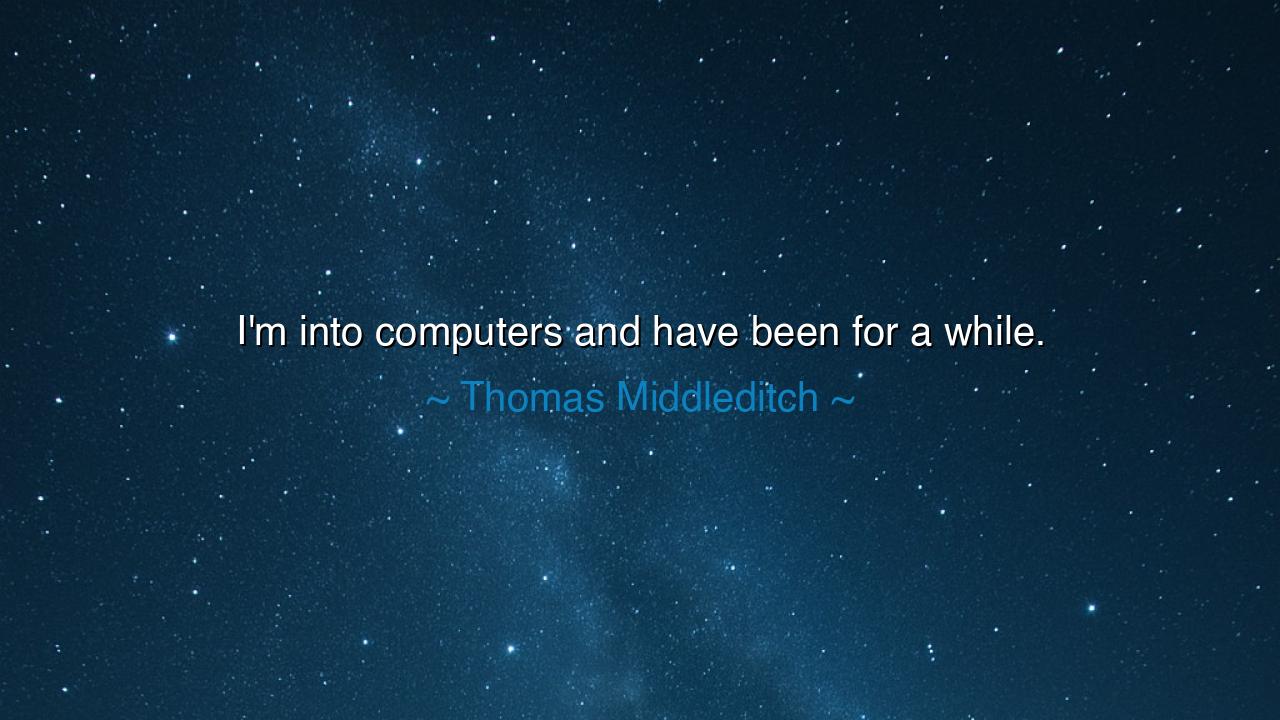
I'm into computers and have been for a while.






Hearken, O children of generations yet unborn, and attend to the words of Thomas Middleditch, who spoke with quiet honesty: “I'm into computers and have been for a while.” In this simple statement lies the profound truth of passion, dedication, and the power of sustained curiosity. Though brief, it echoes an eternal principle: that mastery is born not in fleeting enthusiasm, but in the steady, patient devotion to that which fascinates the mind.
Consider first the phrase “into computers.” These devices, wrought of circuits, logic, and human ingenuity, are more than mere tools; they are gateways to creation, understanding, and connection. To be drawn to them is to be drawn to the very architecture of thought, the mechanisms by which humans extend their minds beyond flesh and memory. Middleditch’s declaration is not simply about interest—it is a recognition of the profound opportunity that arises when curiosity meets action.
The second truth lies in the acknowledgment of time and persistence: “have been for a while.” Passion without duration is but a spark; sustained engagement is the fire that illuminates the path to skill, innovation, and insight. History bears witness to this truth. Consider Ada Lovelace, who devoted herself tirelessly to understanding Charles Babbage’s Analytical Engine. Though the world did not yet grasp the potential of her work, her steadfast engagement laid the foundation for modern computing, a testament to the power of long-term dedication.
Middleditch’s words also evoke the value of personal journey and exploration. To be “into” something is to allow oneself the freedom to explore, to fail, to question, and to experiment. The computer becomes not only an instrument but a canvas, a laboratory, and a companion in the quest for knowledge. Leonardo da Vinci, centuries before, approached every field—anatomy, engineering, art—with this same mindset: a devotion born not of obligation, but of deep and abiding curiosity.
There is a subtle teaching here about authenticity. Middleditch does not claim mastery or grandeur; he simply confesses his interest and long-standing engagement. True engagement, he suggests, is humble and persistent, often hidden from the eyes of the world, yet forming the bedrock upon which greatness may be built. It is in these quiet, consistent acts of attention that skill, wisdom, and creativity are forged.
From this, a lesson emerges: identify that which captivates you, and allow it the time and space to grow within your life. Passion cannot be rushed; mastery cannot be forced. By giving oneself fully to that which excites and challenges the mind, one cultivates insight, resilience, and innovation. Each day spent in pursuit of understanding is a step toward unlocking potential that may one day influence the world.
Practical action flows naturally from this insight. Dedicate time to learning, experimenting, and exploring your chosen field. Embrace mistakes as teachers, curiosity as compass, and consistency as your guide. Whether computers, art, or any other pursuit, allow yourself to become deeply and honestly engaged over time, for it is in this sustained attention that greatness is born.
Finally, remember the eternal truth: life’s marvels are discovered not in idle fascination, nor in fleeting desire, but in the patient devotion to what stirs the soul and sharpens the mind. Middleditch’s simple declaration is a clarion call: embrace your passions, cultivate them with diligence, and let the journey of exploration shape both your character and your contribution to the world.
If you wish, I can also craft a narration-ready version of this passage, emphasizing the emotional cadence and heroic undertones suitable for oral storytelling.






AAdministratorAdministrator
Welcome, honored guests. Please leave a comment, we will respond soon